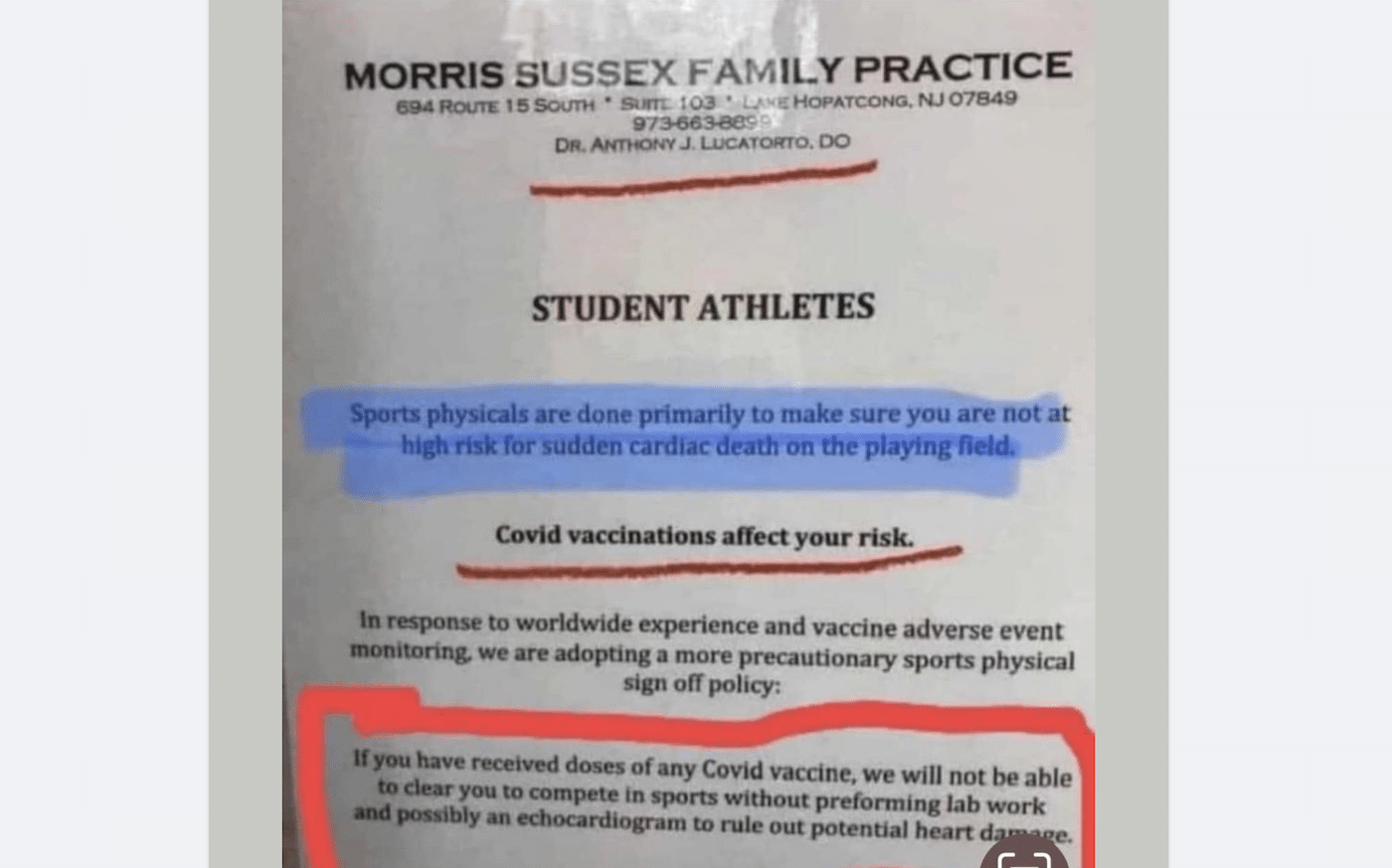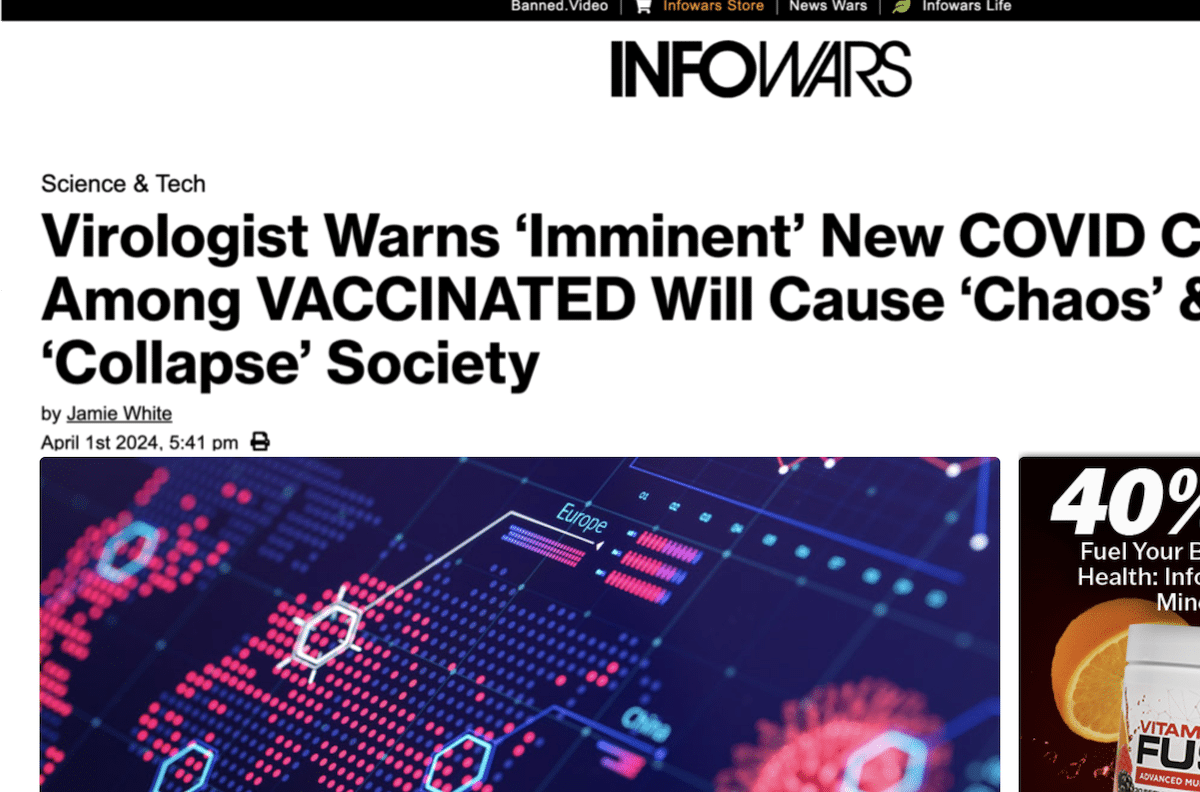- Health
Study led by UCSF researchers didn’t study vaccinated people’s susceptibility to variants; it found vaccine breakthrough cases to be a minority of infections
Key takeaway
COVID-19 vaccination has been demonstrated to reduce the risk of infection, hospitalization, and death. Although certain virus variants like Delta are better at evading protection conferred by COVID-19 vaccination, this doesn’t undercut their protective value. Unvaccinated people are more likely to get infected and die from COVID-19, even from virus variants, as compared to vaccinated people.
Reviewed content

Verdict:
Claim:
“The California study finds that vaccinated individuals are more susceptible to COVID variant infections than unvaccinated”
Verdict detail
Misrepresents source: The authors observed that vaccine breakthrough cases made up just 9.1% of their study cohort, suggesting that vaccinated people are less likely to be infected overall compared to unvaccinated people, which contradicts the article's claim. The claim that the study found vaccinated individuals to be more susceptible to variant infections is unsubstantiated and a misrepresentation of the findings.
Full Claim
“The California study finds that vaccinated individuals are more susceptible to COVID variant infections than unvaccinated. [Geert] Vanden Bossche has been warning that vaccine antibodies would suppress natural antibody responses. The vaccine antibodies take control of the immune system and defend only against a targeted virus”; “Among vaccinated individuals, a COVID variant virus is not recognized by the specialized antibodies provided by the vaccine, and the natural antibodies have been programmed to stand down.”
Review
An article published by The Conservative Treehouse claimed that a “California study finds that vaccinated individuals are more susceptible to COVID variant infections than unvaccinated”. This claim was based on a preprint (a study not yet peer-reviewed by other scientists), led by researchers at the University of California San Francisco (UCSF)[1]. The article was shared more than 1,600 times on Facebook, according to social media analytics tool CrowdTangle.
The preprint examined the virus in 1,373 samples that tested positive for SARS-CoV-2 by PCR testing between 1 February and 30 June 2021. The samples were taken from patients at UCSF hospitals and clinics and from community testing performed by a commercial lab in San Francisco County.
Health Feedback reached out to the corresponding author of the preprint for comment about the claims in the article. In an email, Charles Chiu, professor of laboratory medicine and medicine at the University of California, San Francisco, told Health Feedback that The Conservative Treehouse article’s representation of the study is inaccurate and misleading [see full comment here].
“Our report showed that 81% of COVID cases (1248 out of 1373 cases) were in unvaccinated individuals while only 9% (125 out 1373 cases) were in fully vaccinated individuals,” he explained. “Therefore, in our study, there were approximately 10 times more cases of COVID in unvaccinated individuals than in vaccinated individuals.” In short, the study’s findings suggested that vaccinated people in general are less likely to be infected compared to unvaccinated people in the first place.
Chiu also pointed out that they had observed fewer hospitalizations among vaccinated people than unvaccinated people, and that viral loads in vaccine breakthrough cases that didn’t show symptoms of illness were lower than in unvaccinated people. This is consistent with scientific studies showing that vaccinated people are less likely to be hospitalized and die from COVID-19 compared to the unvaccinated.
Their findings “support vaccination to prevent spread of the virus in the community and decrease the number of hospitalizations and deaths from COVID,” he concluded. “Vaccines against SARS-CoV-2 were developed with the primary goal of preventing hospitalizations and deaths from COVID, and they have remained very effective in doing so.”
The researchers wanted to understand which virus variants were responsible for infections in vaccinated people. By using a technique known as whole genome sequencing, researchers are able to identify the mutations harbored by a virus, and consequently identify if it is a variant, and if so, which one. In the preprint, researchers reported that infections in unvaccinated people were mainly caused by variants that hadn’t developed antibody resistance. By contrast, infections in fully vaccinated people were more likely to have been caused by antibody-resistant variants, although not variants with a higher infectivity.
The study’s findings that antibody-resistant variants cause a higher proportion of infections in vaccinated people isn’t unexpected, as these variants are better equipped to overcome a vaccinated person’s immune system. It also isn’t evidence that the immune system of a vaccinated person is weaker than an unvaccinated person’s, as the article claimed. In unvaccinated people, it isn’t necessary for a virus to carry mutations for antibody resistance, given that these people don’t have protection against the virus, at least in those who haven’t been infected before.
In order to compare the susceptibility to infection by a variant between two populations (e.g. vaccinated and unvaccinated), what researchers would do is compare the incidence of infection by that variant in all vaccinated people to the incidence in all unvaccinated people (an epidemiological concept known as attack rate). But the preprint doesn’t involve this kind of comparison; it studied the proportion of variants among infected people only, not in all vaccinated or unvaccinated people. Therefore the study in no way showed what the article claimed it showed.
Chiu also clarified that their study didn’t address the other claims made in the article, specifically that “The vaccine antibodies take control of the immune system and defend only against a targeted virus” and that variants aren’t recognized by the immune system of vaccinated people. Therefore, these claims are unsupported by the study and the article provided no other data to support them.
In fact, a study published in June 2021 in the journal Science Translational Medicine contradicts the article’s claims, showing that the antibodies produced by vaccinated people can indeed tackle viruses that carry mutations[2].
The article also claimed that the study’s findings proved Geert Vanden Bossche right. Vanden Bossche is a scientist who previously claimed that mass vaccination would create more dangerous virus variants. Health Feedback previously reviewed his claims and found it to be unsupported by scientific evidence.
Contradicting the article’s implication that COVID-19 vaccination poses a danger and is therefore to be avoided, the preprint authors concluded that:
“Several studies have demonstrated that the vaccine remains highly effective against preventing symptomatic breakthrough infections resulting in serious illness leading to hospitalization and/or death. Our findings are consistent with these other studies, as there were fewer hospital admissions and no deaths in vaccinated patients as compared to unvaccinated patients, though these differences were not statistically significant due to low case numbers.”
Scientists’ Feedback

Professor of Laboratory Medicine and Medicine, University of California, San Francisco
This article misinterprets the data presented in our report, which I emphasize is still in the process of peer review and was submitted early as a non peer-reviewed preprint to the medRxiv web site.
1. The claim that “vaccinated individuals are more susceptible to SARS-CoV-2 variant infections (or COVID-19) than unvaccinated (individuals)” is incorrect and is patently false. Our report showed that 81% of COVID cases (1248 out of 1373 cases) were in unvaccinated individuals while only 9% (125 out 1373 cases) were in fully vaccinated individuals. Therefore, in our study, there were approximately 10 times more cases of COVID in unvaccinated individuals than in vaccinated individuals. Our study also focused on vaccine breakthrough cases and showed that infections by “antibody-resistant” variants carrying one or more mutations associated with immune evasion, such as Beta, Gamma, and Delta variants, are overrepresented in vaccine breakthrough cases, while infections in unvaccinated individuals generally reflect the overall distribution of variants circulating in the community at the time, i.e., any variant in the community. However, infection by variants (Alpha, Beta, Gamma, Delta, etc.) comprised most infections overall, both in unvaccinated and unvaccinated individuals.
2. Our study was performed at a time when there was simultaneous circulation of multiple variants of the virus, including some that are relatively resistant to neutralizing antibodies. Vaccination prevents the vast majority of infections, but the small subset of vaccinated individuals (9%) who had breakthrough infections at that time were, not surprisingly, more likely to be infected by these “antibody-resistant” variants.
3. Our study does not support in any way the claims that “vaccine antibodies would suppress natural antibody responses. The vaccine antibodies take control of the immune system and defend only against a targeted virus” and “among vaccinated individuals, a COVID variant virus is not recognized by the specialized antibodies provided by the vaccine, and the natural antibodies have been programmed to stand down”. We did not address these issues in our study. Peer-reviewed published data by others show that although there can be reduced sensitivity of “antibody-resistant” variants such as Delta to antibody neutralization elicited, the full dose of the vaccine is still effective in neutralizing the virus and preventing infection[3,4].
4. Finally, our study also found that there “…were fewer hospital admissions and no deaths in vaccinated patients as compared to unvaccinated patients…” and that “…significantly lower viral RNA loads were observed in asymptomatic breakthrough cases as compared to unvaccinated cases…”, which support vaccination to prevent spread of the virus in the community and decrease the number of hospitalizations and deaths from COVID. The effectiveness of the vaccine in preventing hospitalizations from severe COVID is also reported in other published data[4].
5. Vaccines against SARS-CoV-2 were developed with the primary goal of preventing hospitalizations and deaths from COVID, and they have remained very effective in doing so.
To summarize, these three claims are false and misleading and are not supported by the results of our study.
REFERENCES
- 1 – Servellita et al. (2021) Predominance of antibody-resistant SARS-CoV-2 variants in vaccine breakthrough cases from the San Francisco Bay Area, California. medRxiv. [Note: This is a preprint that has not yet been peer-reviewed by scientists.]
- 2 – Greaney et al. (2021) Antibodies elicited by mRNA-1273 vaccination bind more broadly to the receptor binding domain than do those from SARS-CoV-2 infection. Science Translational Medicine.
- 3 – Planas et al. (2021) Reduced sensitivity of SARS-CoV-2 variant Delta to antibody neutralization. Nature.
- 4 – Tartof et al. (2021) Effectiveness of mRNA BNT162b2 COVID-19 vaccine up to 6 months in a large integrated health system in the USA: a retrospective cohort study. Lancet.
UPDATE (10 October 2021):
Prof. Chiu’s comment was received and included after the initial publication. This comment further supports the original verdict and did not modify it.



